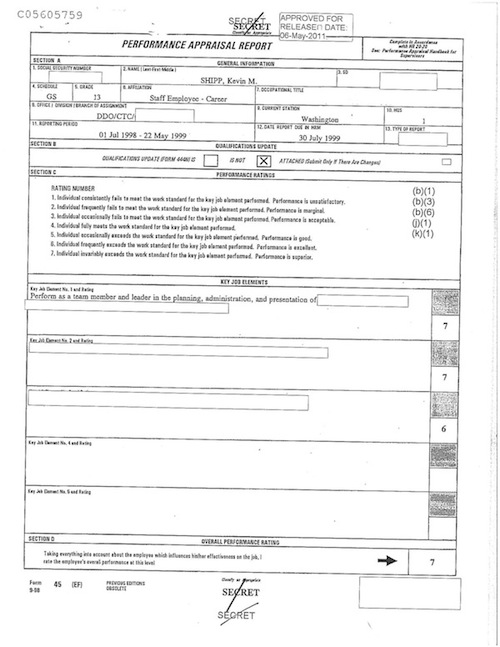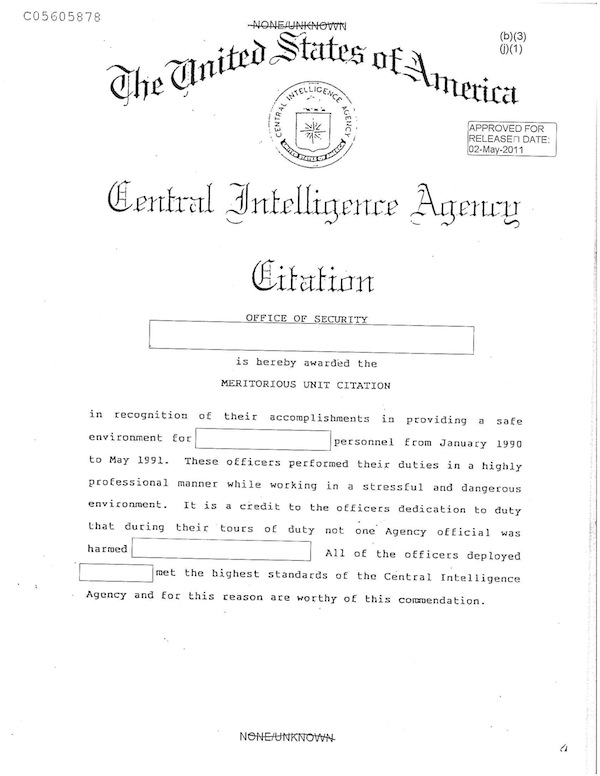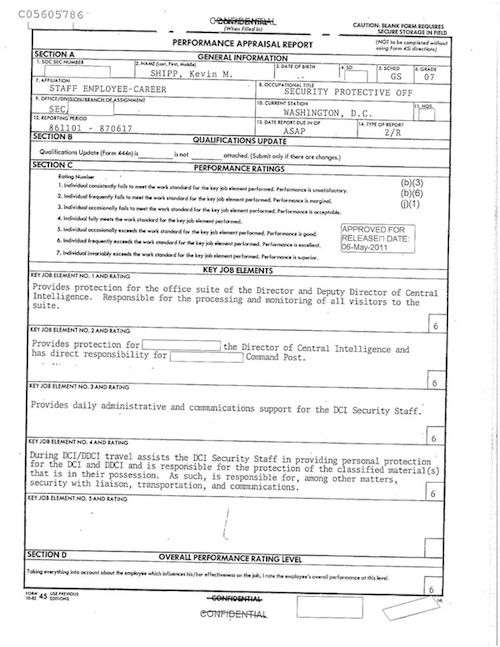
The author’s Performance Appraisal Report from the Counter Terrorism Center.
A frenzied crowd, numbering in the hundreds, began to gather around the line of crime scene tape marking the perimeter of the open grave. Only minutes before, members of the news media and curiosity seekers lingered among the headstones in the huge Holy Rood Cemetery in Westbury, New York. No one knew exactly where the burial was to take place. No one that is, except us. The colorful Director of the CIA, William Casey, had died of a brain tumor in the midst of the “Iran Contra Scandal.” The timing of his death caused great controversy. He was due to testify before the House Permanent Select Committee on Intelligence and the Senate on December 16, 1986 for his role in the so-called “Arms for hostages deal.” Before he was able to testify, on December 15, he was rushed to Georgetown University Hospital after experiencing a seizure at CIA headquarters in Langley, Virginia. He never made the hearings. On May 6, 1987 the cancerous tumor in his brain took his life. The timing was out of the ordinary. Casey’s testimony was critical to the proceedings in the Iran Contra investigation. His death forever removed important information from the investigation. The scandal involved the President of the United States, Ronald Regan, members of the CIA, the NSA and the Department of Defense. The US had been secretly selling arms to Iran, which was under an arms embargo, in an effort to secure the release of American hostages held by Hezbollah. The plan included covertly funneling proceeds from the sale of arms to Iran, to support the anti-Sandinista rebels in Nicaragua, known as the “Contras.” As a result of a congressional investigation and an investigation by the Tower Commission, appointed by the president, fourteen administration officials were indicted, including Colonel Oliver North, Secretary of Defense Casper Weinberger and National Security Advisor John Poindexter. North and Poindexter’s convictions were overturned on appeal and Weinberger was pardoned by George W. Bush.
Some outside the CIA were making claims Casey was not dead, but was simply in hiding. Others claimed the CIA had organized the surgery to remove portions of his brain, so he could not remember the details of the scandal. These bizarre rumors were, of course, not the case. As I noted in chapter three of this book, reporter Bob Woodward claimed in his book Veil the Secret Wars of the CIA (page 587, paragraph 7) he had gotten into Casey’s hospital room and the DCI had admitted to him in February 1987 he was aware of the diversion of funds to the Contras. I dispute Woodward’s account of his meeting with Casey.
In preparation for Casey’s burial at the cemetery in Westbury, I and two other agents were assigned to advance and secure the site for the funeral. Several cabinet level officials in the Reagan administration, current and former CIA directors, high ranking CIA officers, participants in the Iran Contra affair, celebrities and members of foreign delegations were due to attend the burial. A motorcade consisting of 80 limousines was expected. The President of the United States had departed for Washington following the memorial service held at St. Mary's Roman Catholic Church in Roslyn Harbor, Long Island.
A Rude Awakening
After twelve hour days and seven day weeks, the protective detail drove the armored limousines to Roslyn, New York to cover Casey’s wake and funeral. We were tasked with protecting Casey’s body and Agency officials who would be attending the ceremonies. We arrived in New York late in the evening and checked into the hotel. Over dinner we planned the operation. After planning was complete, we retired for the few hours of sleep we would get before the morning’s movement. I checked into my room, rolled my luggage to the corner, climbed into bed and turned out the light. I slept like a rock. It seemed like only minutes had gone by when the alarm went off. I jumped out of bed and hurried to the bathroom to get ready. As I looked in the mirror, I was shocked. Smeared in my hair, all down the side of my face and on my T shirt was a brown, slimy substance. I had no idea what it was. Had I been the victim of a huge diarrhea “burst” in the middle of the night? Arrrggghhhh! Had I performed the first time ever feat of projectile number two? Slowly, I reached up and wiped the substance with my finger. I looked at it very carefully; I was very concerned. Upon inspection, I realized - it was chocolate; chocolate mint to be exact. All night, in a deep sleep, I had rolled in the chocolate mints the maid had left on the pillow, which had slipped into the crack where I could not see them. My shock turned to laughter. “What a Dufus” I said to myself. I was one relieved agent to find I had not experienced a catastrophic intestinal event.
The Burial
To perform the protective advance for the funeral we were given a map indicating where the grave would be located. Orders were given to secure the cemetery for the burial and the attendance of a large number of government officials from Washington. Our team proceeded to the location given to us on the map. There was an “X” where the grave site was supposed to be located. We arrived at the spot and, to our chagrin, there was no open grave. There were no preparations for a burial. There was no open grave even near the site. We were in the wrong place. In the huge cemetery, we had to perform a frantic search to locate the grave site before the huge crowd arrived. As we scoured the cemetery looking for the grave site, I noticed a couple who had arrived an hour early (thank God). I had met them at the wake the evening before. They were standing at a different location in the cemetery. I approached them with a greeting and began a pleasant conversation. During the conversation, the couple volunteered the open grave in front of them was the grave site for Casey’s burial and did not bear the Casey name yet because Sophia wanted him buried next to relatives, whose name was on the headstone adjacent to the open grave.
Experiencing a Les Miserable’s sort of relief and jubilation, I advised the other agents this was the correct burial site. How do you secure a large, open cemetery for a gathering of some of Washington’s most high level and controversial figures? We did so using a very sophisticated process (tongue in cheek). The evening before, I devised a plan to secure the site using crime scene tape, and the team placed agents around the tape and through the cemetery investigating suspicious individuals. The idea worked. We bolted into action, ran the crime scene tape around the grave, with a loop opening for the limousines, maintained radio contact with the agents in the approaching motorcade and began questioning suspicious people lingering near the site; obviously not there to show reverence to loved ones.
.
I scanned the area around the burial site, before the news media and others lingering in the cemetery figured out the plan. I noticed two gentlemen standing across the street from the open grave under a small cherry tree. They had seen us cordon off the area. I approached the men, introduced myself and asked who they were. They responded in a Russian accent that they were “friends of the family.” Obviously, the KGB had decided to attend the event. I cordially ended the conversation, went back to preparations and notified the other agents they were there.
Once the perimeter tape was up we took our positions, dressed in dark suites. The news media and curiosity seekers scurried to the site. Hundreds of people began to crowd around the perimeter, while the three of us held them back, waiting for the Nassau County police and the other agents to arrive. Reporters and cameramen began to force their way in and duck under the tape to get near the grave. We pushed them back, as politely as we could, ordering them to stay behind the line. During the wake the evening before, members of the news media had been very professional and gracious. In that case, I was the agent responsible for keeping people from entering the property, and was later posted at the door of the residence to screen people entering the wake. Reporters and their camera crew were courteous and cooperative. It made our job much easier. Because of the sheer intensity of events at the funeral and the significance of the story, the press was much more aggressive and difficult to control, but generally remained professional.
The night before the wake in Roslyn Harbor, we received information indicating certain groups were going to disrupt the event and throw cow’s blood on the casket. Other CIA officials had been threatened with assassination. Cabinet level officials and personalities in the Iran Contra affair attending the ceremony were at risk as well. As the funeral proceeded, we created as much order as we could; out of sheer pandemonium. The motorcade was so long, it extended out of the established perimeter and down the cemetery street. Several high level officials had to walk some distance to the grave site, with their security and the agents we could spare accompanying them. The crowd pressed against the tape, stretching it to its limit. The remaining detail agents arrived with the motorcade, accompanied by the Nassau County police. The police posted outside the perimeter, controlling the crowd and traffic. The Nassau County police officers were outstanding throughout the entire event. We could not have done it without them. Our job was to face the crowd at the perimeter tape, scan them, watch people in the throng and keep an eye on those approaching from the cemetery. If there was ever a time an assassination attempt could take place, this was it.
I noticed a lady, dressed in a dark blue suit, coming from the back of the cemetery, her auburn hair pulled tightly back in a pony tail and wearing dark glasses. Aggressively, she pushed her way through the crowd, her right hand in the purse she held open in front of her. Her hand remained in the purse as she forcefully pushed her way through the crowd to the perimeter tape, next to the press and nearest the group of dignitaries attending the funeral. Her body language was rigid and her jaw was clenched.
“This could be it,” I thought to myself.
My only recourse was to walk up to the edge of the tape, face the woman, block her and any shot she could take, using my body as a shield and be ready to take her down if necessary. This was my job. I stood face to face with her, staring directly into her sun glasses, conveying the message “Don’t do it.” We stared at each other for about five minutes. She turned around, pushed back through the crowd and disappeared in the multitude. I notified the other agents and the police, giving her description. We never saw her again.
Despite the size and complexity of the event, the entire operation went off without a hitch. When it was over, the agents went out to a small, private pub and had a cold beer. We had pulled it off. Robert Gates gave the agents a personal commendation for our performance. At the end of my assignment, I received a letter of commendation from the Chief of the DCI Security Staff for performance as an agent on the detail. It meant a great deal to me. Like so many other awards we received at the CIA, it was filed away in a classified safe, never to see the light of day.
My tenure as an agent on the protective staff of the DCI and DDCI was an intense, but personally satisfying time. I was part of the day-to-day successes, triumphs and failures that occurred at the top ranks of the CIA. My job was to give my life, if necessary, for the DCI, the DDCI and the CIA Station Chiefs we interacted with around the world. My fellow agents and I accepted this, were trained for it and fully intended to perform the duty if the need arose. I spent more time with the DCI and his family than I did with my own.
Chasing the Wind
One sunny morning, as I occupied the command post at a discreet location an alarming, but humorous, event occurred. Please forgive any vulgarity here, none is intended. Because of the long hours and the intense stress of the job, the agents developed humorous names for each other and running jokes we would jab at one another during long days. We had a daily contest to see which agent could “break wind” the most, do it the most often, and do it upon request. We called it “Boof on Command.” One agent, whom I will not mention by name, had a particular gift for breaking wind upon request; anytime, anywhere, any place. It was some kind of gift.
This particular morning, the detail was preparing to drive the DCI to his office at CIA headquarters. The agents were posted in the armored motorcade vehicles, motors running, preparing for his departure. I occupied the command post with radios on to monitor the detail’s movements. Unexpectedly, Casey burst into the command center and requested I activate the secure telephone so he could speak with a member of the President’s cabinet. As the Director sat in the chair waiting for the answer on the other end of the phone, the agents in the motorcade began to engage in a wind-breaking contest over the radio; knowing we all would hear it. Unfortunately, there was an active radio right behind the Director’s head as he waited for the secure connection. I had the radios turned up so I could hear the agents from wherever I was in the Command Post. The sound was relatively loud. The agents, one by one, began to break wind in their radios; loud “reports” coming out of the radio behind the Director. My adrenalin level skyrocketed. I could not go over, ask the Director to move and grab the radio. This would draw attention to what was happening. But, I could not let the radio “bursts” continue, potentially getting us in trouble. Fortunately, the Director’s call went through and he became so focused on the conversation he did not hear what was emerging from behind him. Seeing my opening, I quickly ran out to the motorcade and, holding back the laughter, advised the agents to stop breaking wind in the microphones because the Director was in the Command Post. I have never heard so many radio-off clicks at one time. Fortunately for us all, the Director, focused on his duties, never heard the unique radio traffic. We laughed about it for months.
By my fifteenth year in the CIA I received a meritorious unit citation for a life threatening mission against a deadly terrorist organization, an exceptional performance award for uncovering a global vulnerability which threatened the lives of our agents abroad, a second meritorious unit citation for an international operation conducted with some of our closest allies, two more exceptional performance awards and two awards for my work as a liaison officer with foreign officials. I was in the top career performance category. The CIA was my career. I loved it and was dedicated to the mission I was assigned to, even to the point of giving my life.

The author’s Performance Appraisal Report from the Counter
Terrorism Center.

The author’s Performance Appraisal Report from the Counter Terrorism Center.

Meritorious Unit Citation presented to the Author for successful completion of a dangerous assignment.

The author’s Performance Appraisal Report from the DCI Security Staff.

The author’s Performance Appraisal Report from the DCI Security Staff.

The author’s Performance Appraisal Report from the Counterintelligence Center.

The author’s Performance Appraisal Report from the Counterintelligence Center.